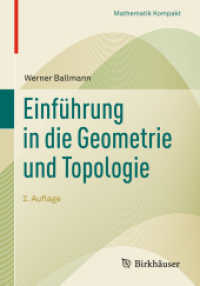- ホーム
- > 洋書
- > 英文書
- > History / World
Full Description
This book compares the enlightenment thought of China and Japan amid 19th-century Western imperialism, offering a groundbreaking analysis of how two iconic thinkers shaped their nations' divergent paths to modernity.
Through twelve analytical chapters, the book explores how Yan Fu of China and Fukuzawa Yukichi of Japan navigated the paradox of tradition versus progress. Key themes include their contrasting approaches to Western science, political freedom, economic reform, and cultural identity, revealing why Japan embraced rapid modernization while China struggled. The work dissects critical frameworks such as "Chinese essence/Western application" versus "Japanese spirit/Western knowledge" and is enriched by an analysis of archival documents on their views on law, religion, education, and historical evolution. By juxtaposing closed-door policies of Ming/Qing China and Tokugawa Japan with post-collision transformations, it illuminates how enlightenment ideals fueled national survival.
This cross-cultural analysis is essential for historians, Asian studies scholars, and policymakers as it bridges philosophy, political science, and intellectual history. Librarians and educators will appreciate its relevance to debates on global modernization and ongoing cultural dialogues in East Asia.
Contents
Chapters of Times---Background and Issues of the Times 1: The Background of the Era - The Crisis and Choices of the Eastern Empires 2: The Tasks of the Era - "Modernization" and "Enlightenment Thought" in China and Japan 3: A Brief Introduction to the Enlightenment Careers of Yan Fu and Fukuzawa Yukichi Chapters of Culture——The Perspective of East and West Culture 4: The Framework of Eastern and Western Cultural Discourses in the Historical Process of China and Japan 5: Yan Fu and Fukuzawa Yukichi's East and West cultural theory 6: Views on Science and Philosophy 7: Political Categories 8: Economic Thought 9: Historical Consciousness 10: Attitudes towards Religion 11: Theories of Reform and Enlightenment 12: Views on Education and Educational Practices








